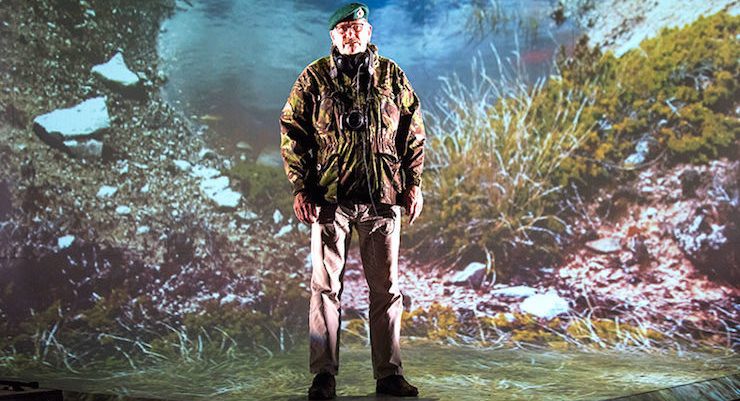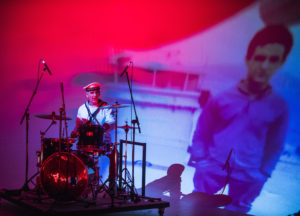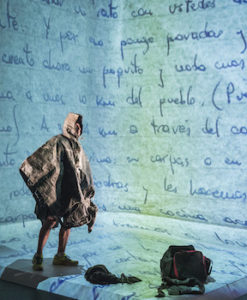
Minefield / Campo Minado is a bilingual theatre piece that reunites Argentine and British veterans from the Falklands/Malvinas war nearly four decades on. The production premiered in London in 2016 in the run up to the Brexit referendum. Looking for Drama spoke to its creator, Lola Arias, about the project, its impact and its relevance for the heightened nationalisms of today. Arias began with her own recollections of the 1982 war.
Lola Arias: I was 5 years old, but my mother tells me that we used to play war, pretend we were fighting; hide under tables in case the English attacked. My sister, who was in school, wrote letters to the soldiers. In all state schools there was an incentive that children wrote letters to the soldiers, and when I began to work with the veterans they told me they’d kept them. Often letters from their families did not arrive. This was a form of compensation.
LFD: For the British, the Falklands were a distant fragile British territory across the world that required defending. For Argentina, the Malvinas was an occupied land, a wound that never healed. But in the way it was employed by the respective governments to silence protest and unite the nation in a common cause against an enemy, there are striking comparisons:
Lola Arias: In Argentina, the war was a way for the military government to recover popularity. It was a time of discontent and demonstrations against the dictatorship and it was a way to achieve consensus by displacing the enemy to outside the country. It worked: many of those demonstrating on the 30th of March in Buenos Aires’ Plaza de Mayo against the government reappeared on the 2nd of April to celebrate the recuperation of the Islands.

©Tristram Kenton
Lola Arias: In 2013, when I began the project, it was not easy to receive institutional support. The Argentine government were against it. International festivals helped out, but national theatres were closed to us. At the very last minute, the rector of the University of San Martín in Buenos Aires (UNSAM), Carlos Ruta, stepped in and gave us support. Many Argentine institutions were afraid that bringing Argentine and British soldiers together meant accepting British sovereignty of the Islands.
LFD: At that time, a lottery was held to select young Argentines for military service. Subsequently, 70 per cent of the Argentine soldiers sent to the Malvinas were conscripts who had done no more than 6 to 9 months of training. The Argentines’ average age was 19, while the average British soldier was 23. During the long process of research, 70 veterans were interviewed and 6 chosen to take part. It was from the singular and contrasting stories of each of these individuals that the theatre piece emerged. Arias gives an example of the contrasting experiences of two Argentine veterans:
Lola Arias: Gabriel was terrified to go to war. He was 18 years old and an aspiring musician. He said the only thing he did there was try to survive. He would write letters to his family saying that that he didn’t know what he was supposed to do, and that the only time he had shot a rifle was in a training exercise. Marcelo, on the other hand, volunteered. He felt prepared to fight. Despite their differences, however, Gabriel and Marcelo went to the Malvinas with the same sense of nationalism.

©Tristram Kenton
LFD: The commemoration of the war in Argentina seems at odds with the British having moved on or even left it behind. But is this really the case? Minefield premiered at London’s Royal Court in June 2016. The nationalism of Brexit revived the zeal of Thatcherism and was a consequence of those neoliberal policies the former-Prime Minister implemented, says Arias:
Lola Arias: For the British, Minefield is a work that reminds them of a turning point in their history: 1982 was the year in which Thatcherism began. When Britain won the war, she began to put neoliberal policies in place that controlled the trade unions, and she was re-elected the following year. We premiered the piece in the run up to the Brexit vote. It was extraordinary to see how history was repeating itself. It marked a revival in a way of thinking; a nationalist fervour that can be associated with Thatcherism.
LFD: When the play subsequently premiered in Buenos Aires, however, there were many Argentine veterans who were angered by it, Arias explains:
Lola Arias: Many accused the Argentine participants of treachery and said that they could never applaud English soldiers. It is acknowledged that Argentine soldiers were treated dreadfully by their own officials, officials that belonged to the dictatorship; there are many documented cases and on-going campaigns to uncover some of the atrocities of war: torture, abuse by officials against their own soldiers. But this aside, veteran soldiers remain fervent patriots and demand the return of the Islands to Argentine sovereignty.
LFD: On the surface there are profound national differences in the veterans’ experience and perspective on the war. Yet as individual stories unfold the differences dissolve. Minefield / Campo Minado is about how the war has left its mark on each and all veterans. Time does not necessarily heal, says Arias, trauma has been shown to manifest itself decades later, sometimes with fatal results.
Lola Arias: It was a tremendous challenge for participants on both sides. When he returned from the war, Marcelo could not even listen to English music. Taking part in the piece was an incredible trial for him. But when he confronted the British veterans and perceived their suffering, all that hate and anger began to shift. For Marcelo in particular, understanding the pain of his enemies helped him reconcile himself with his own experiences. This process was different for each of them, but as a group it was transformative.
An Argentine timeline (BBC)
Theatre of War – a film based on the making of and consequences of the theatre production
New dates for Campo Minado / Minefield 2019
